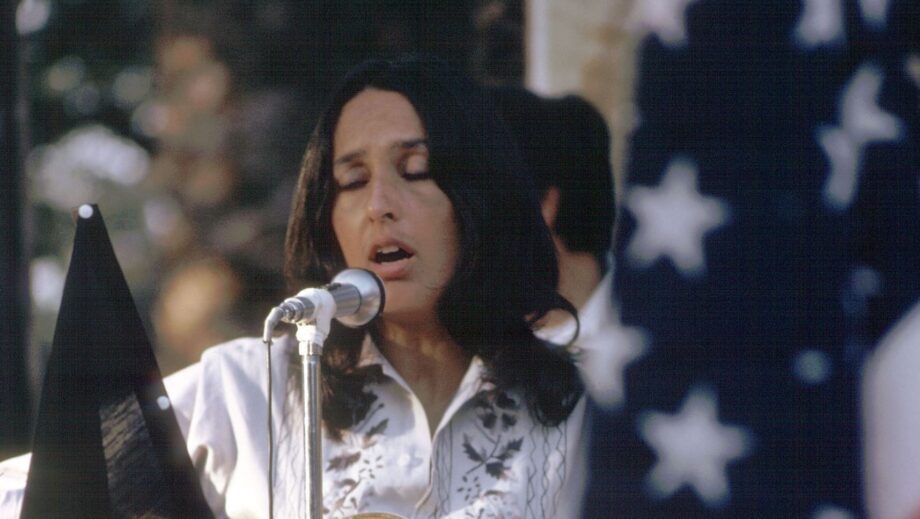Like the movement to unionize industrial workers in the 1930s and the African American civil rights movement in the 1950s and 1960s, the farmworkers’ movement was a singing movement.
It consciously followed the examples of earlier movements in which collective singing raised the spirits of movement participants, promoted a strong sense of shared identity among them, and gave them the hope and courage to carry on in the face of adversity. Members of the farmworkers’ cultural ensemble, El Teatro Campesino, created Spanish versions of well-known songs from both established labor unions and the civil rights movement, which they sang in the fields and on picket lines as part of their fledgling union’s efforts to organize laborers in the vineyards surrounding Delano, California.
They had done so at the urging of Cesar Chavez himself, who understood in his bones the vital role music played in the social life of his people.
Joan Baez (left) and Cesar Chavez (middle). Bob Fitch Photography Archive Department of Special Collections Stanford Uni. Library
In this regard, it is important to remember that El Teatro Campesino not only gave expression to the concerns of farmworkers through their skits and plays, but just as importantly through their music, which came to form the soundtrack of the farmworkers’ movement. Insofar as the farmworkers became emblematic of the broader struggle for the rights and dignity of Mexican Americans, these songs also came to form part of the soundtrack for the entire Chicano Movement in the 1960s and 1970s.
Two of the original members of Teatro Campesino, Agustín Lira and Luis Valdez, each remember how they transformed the old labor and civil rights hymns into new standards for the farmworkers’ movement, including “Nosotros venceremos” [We Shall Overcome] and “No nos moverán” [We Shall Not Be Moved]. Lira remembers first hearing the “freedom songs” of the Black civil rights movement on a record being played at the farmworkers’ headquarters in Delano in the early days of the strike against vineyard owners.
He was impressed by the power of these movement songs, sung in chorus, and immediately saw their potential as an organizing tool for the farmworker cause.1 Valdez remembers El Teatro making a point of singing “Nosotros venceremos” and “No nos moverán” at a stop at Howard University on their first national tour in 1967 to underscore their solidarity with the Black liberation movement.2

Joan Baez singing for UFW ©Bob Fitch Photography Archive Department of Special Collections Stanford University Library
In addition to developing a repertoire of Spanish adaptations of English-language union and civil rights songs, members of Teatro Campesino wrote their own songs to be sung on picket lines and at rallies. These included “El Picket Line,” “Huelga en general” [General Strike], and “El esquirol” [The Scab]. Other songs, such as Agustín Lira’s “La Peregrinación“ [The Pilgrimage], which commemorated the 1965 farmworker march from Delano to Sacramento, and Daniel Valdez’s plaintive “Brown Eyed Children of the Sun” dealt with farmworker issues and identity, but were intended to be performed by individual singers and listened to by an attentive audience.
Another song that came to serve as the unofficial anthem of the farmworkers’ movement was “De Colores,” a popular Catholic church song known to many Mexicans and Mexican Americans. Although lyrics of this song are hardly political, farmworker activist Kathy Murguía recalls how meaningful it became in the union’s struggles to better the working conditions and quality of life of the people who worked the land around Delano:
I remember singing ‘De Colores’ at the weekly Friday night strike meetings that were held in Delano [in 1965 and 1966] . . . Every meeting ended with us joining hands and singing ‘De Colores,’ which enhanced a sense of community, of being connected in a struggle for justice . . . The rooster, the hen, the chicks that sing, the great loves of many colors—these images brought such joy, such pleasure and . . . such hope. For me, singing ‘De Colores’ felt powerful. Even today, recalling the smiles and brightness on the faces of the workers as they sang provides a sense of hope. We were part of a movement, and in small incremental ways, we believed we were changing the course of history, and ending exploitation.3
If “De Colores” became the anthem of the farmworkers’ movement, “No Nos Moverán” became its fight song. In a phone conversation I had with her in 2014, nearly a half century after the strike in Delano, UFW leader Dolores Huerta vividly remembered the significance of this song, and of music more generally, to the farmworker struggle:
We sang ‘No Nos Moverán’ every day . . . Because we were on those picketIt was a long time to be on strike! We sang to keep our spirits up. Music was extremely important to keep people from getting discouraged. The song “No Nos Moverán” symbolized the spirit that we had and that we needed to maintain. Music was important to keep people strong and let them know that eventually we’re going to win as long as we don’t give up. Joan Baez played a crucial role in supporting the farmworkers’ strike, donating money, singing at funerals, and sitting with Cesar Chavez during his 1972 fast. She also popularized farmworker songs among wider audiences by recording them and frequently performing them in her concerts. The importance of singers and musicians in defending the rights of the people who grow our nation’s food cannot be overstated.





